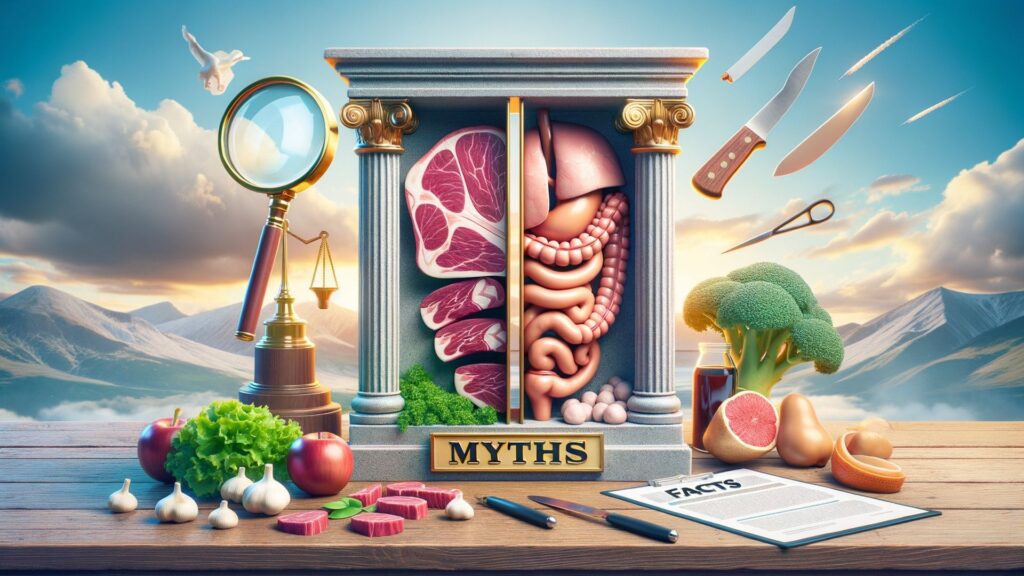Diet Myths Debunked: Unraveling the Truth About the Carnivore Diet
The Carnivore Diet is a dietary approach that has gained traction in recent years, emphasizing the consumption of animal products. This eating regimen, often referred to as an all-meat diet, excludes plant-based foods and focuses on animal-based foods such as red meat, poultry, fish, and dairy products. Proponents of the carnivore diet claim various health benefits, including improved gut health, mental clarity, and stable blood sugar levels.
Understanding the Carnivore Diet
What is the carnivore diet all about? The carnivore diet involves a strict dietary regime that solely revolves around animal products, eliminating plant-based foods entirely. Advocates of this diet believe that it can offer numerous health benefits, including weight loss, reduced inflammation, and enhanced energy levels.
Are there any health benefits associated with the carnivore diet? Proponents of the carnivore diet often cite improved digestion, mental clarity, and weight management as significant advantages of this eating approach. Some individuals claim to have experienced relief from autoimmune conditions and gastrointestinal disorders by following a meat-only diet.
Is the carnivore diet as bad as some claim it to be? While critics express concerns about potential nutritional deficiencies and long-term health risks associated with the carnivore diet, proponents argue that when well-planned, this diet provides essential nutrients without the need for plant foods.
Debunking Common Myths
Myth: The carnivore diet is nutritionally deficient. Contrary to popular belief, when carefully planned and supplemented if necessary, the carnivore diet can meet all essential nutrient requirements. Proponents often emphasize the nutrient density of animal foods such as organ meats and the bioavailability of nutrients in these products.
Myth: Red meat consumption leads to heart disease. While excessive intake of processed or poorly prepared red meat may have negative health implications, moderate consumption of high-quality, grass-fed red meat is a valuable source of nutrients like iron and zinc without significantly increasing the risk of heart disease.
Myth: Carnivore diet lacks essential nutrients found in plant foods. While plant foods provide certain nutrients like vitamin C and fiber, individuals following the carnivore diet can obtain necessary nutrients from organ meats, high-quality animal products, and supplementation where needed.

Exploring Nutritional Aspects
What are the essential nutrients to consider on the carnivore diet? Protein, essential fatty acids, vitamins, and minerals are crucial components of a balanced carnivore diet. While plant foods are rich in certain nutrients, animal products can also offer a wide array of essential nutrients required for optimal health.
How does the carnivore diet affect cholesterol levels? Contrary to common belief, the consumption of animal fats in the context of a low-carb, meat-based diet may not significantly impact cholesterol levels in a negative manner. In fact, some individuals experience improved lipid profiles and cardiovascular health markers on the carnivore diet.
Is vitamin C intake a concern on a meat-only diet? While vitamin C is predominantly found in plant foods, individuals following a meat-heavy diet can obtain sufficient amounts from organ meats like liver and kidney, which are rich sources of this essential nutrient.

The Controversy Surrounding the Carnivore Diet
Why do some health professionals warn against the carnivore diet? Concerns raised by health professionals often revolve around potential nutrient deficiencies, lack of fiber, and long-term health implications associated with the exclusion of plant foods from the diet. Critics argue that a balanced, varied diet incorporating plant-based foods is essential for overall health.
Are there benefits of the carnivore diet that are often overlooked? Proponents of the carnivore diet suggest that this eating approach can be beneficial for individuals with specific health conditions like autoimmune disorders or digestive issues. Some proponents claim improved mental clarity, reduced inflammation, and weight loss as notable benefits of the carnivore diet.
What are the potential negative impacts of a meat-based diet on the environment? The production of animal-based foods, particularly red meat, can have environmental repercussions such as greenhouse gas emissions and land use. Sustainable sourcing and consumption of animal products can help mitigate the environmental impact of a meat-heavy diet.

Maintaining Balance and Health on the Carnivore Diet
How can individuals ensure a balanced diet while following the carnivore diet? Incorporating a variety of animal products, including organ meats, dairy, and a range of animal-based foods, can help meet essential nutrient requirements on the carnivore diet. Supplementation and periodic monitoring of nutrient levels may also be necessary.
What role do organ meats play in meeting nutrient requirements? Organ meats like liver and kidney are nutrient powerhouses, offering high concentrations of essential vitamins and minerals crucial for overall health. Including organ meats in the diet can help address potential nutrient gaps associated with a plant-free eating approach.
Addressing the concerns about long-term health effects of a meat-heavy diet requires careful consideration of individual health status, regular health monitoring, and consultation with healthcare professionals. While the carnivore diet may offer short-term benefits for some individuals, the long-term health implications warrant thorough evaluation and personalized guidance.
Carnivore Diet Myths Debunked Frequently Asked Questions:
What is the Carnivore Diet and what are its health benefits?
The Carnivore Diet is an eating plan that mainly consists of animal products like meat, fish, and dairy. Some claim health benefits such as improved weight loss, mental clarity, and reduced inflammation.
Is the Carnivore Diet nutrient and vitamin deficient?
While the Carnivore Diet lacks certain nutrients found in plant-based foods like fiber and vitamin C, it can still provide essential nutrients like protein and various vitamins and minerals.
Are there concerns about consuming too much red meat on the Carnivore Diet?
Yes, excessive consumption of red meat on the Carnivore Diet may lead to an overload of saturated fats and cholesterol, which can negatively impact heart health.
What are some common myths about the Carnivore Diet?
Some common myths include that the diet is bad for one’s health, nutritionally deficient, and harmful to the environment due to its emphasis on meat consumption.
How do health professionals view the Carnivore Diet?
Many health professionals express concerns about the long-term effects of the Carnivore Diet, citing potential risks such as nutrient deficiencies and heart health issues.
What are the benefits of the Carnivore Diet?
Proponents claim benefits such as improved digestion, increased energy levels, and potential relief from certain health conditions like autoimmune diseases and skin issues.
Is the Carnivore Diet bad for the environment?
Some argue that the heavy reliance on meat in the Carnivore Diet can have negative environmental impacts, as large-scale meat production is associated with issues like greenhouse gas emissions and land degradation.




